Introduction
In the realm of estate planning, effective marketing is not merely an option; it is a necessity for legal professionals aiming to connect with clients in an increasingly competitive landscape. This article delves into the essential strategies that attorneys can employ to promote their services while adhering to ethical standards and legal regulations.
From understanding the target demographics to leveraging digital tools and compliance measures, the discussion highlights the importance of educating potential clients about estate planning and the critical role that innovative marketing plays in bridging knowledge gaps.
By exploring comprehensive approaches such as:
- Content marketing
- SEO
- Client engagement tactics
Legal professionals can enhance their visibility and establish themselves as trusted authorities in the field, ultimately driving business growth and client satisfaction.
Understanding the Essentials of Estate Planning Marketing
Marketing for estate planning involves the strategic methodologies employed by legal professionals to promote services related to wills, trusts, and other essential estate planning documents. Given the sensitive nature of these services, it is imperative that promotional efforts adhere to ethical standards and comply with legal regulations. A thorough understanding of the target demographics—typically individuals contemplating their future and seeking effective asset management—is crucial.
Notably, a significant 19% of individuals remain unaware of what an advanced healthcare directive involves, indicating a substantial gap in public knowledge that promotion can address. By concentrating on informing prospective customers about these directives, lawyers can bridge this gap and establish themselves as reliable resources.
A strategic promotional approach is essential for attorneys engaged in marketing for estate planning to set themselves apart in a competitive environment while building trust and credibility among potential customers. Considering recent trends, including the 25% drop in property preparation among the least educated populations since 2021, it is vital for legal experts to implement creative promotional strategies that connect with this audience’s needs and concerns. For instance, the case study titled ‘Misunderstanding of Estate Planning Functions‘ highlights that many Americans do not fully understand the functions of a will, with 35% stating they don’t have a will due to a perceived lack of assets, despite having children under 18.
This highlights the necessity for improved education regarding the significance of wills beyond financial assets, such as healthcare choices and guardianship for minors. Merging conventional outreach with modern digital promotion techniques enhances marketing for estate planning by improving the ability to connect with prospective clients. As Hicks from Trust & Will aptly states,
In the past, wealth management has been costly and only accessible to those who could afford to hire a lawyer.
Now, with more inclusive and affordable digital options, everyone can take this vital step to protect their families.
This shift highlights the significance of customizing promotional efforts to not only inform but also enable individuals in making educated choices regarding their asset management requirements.
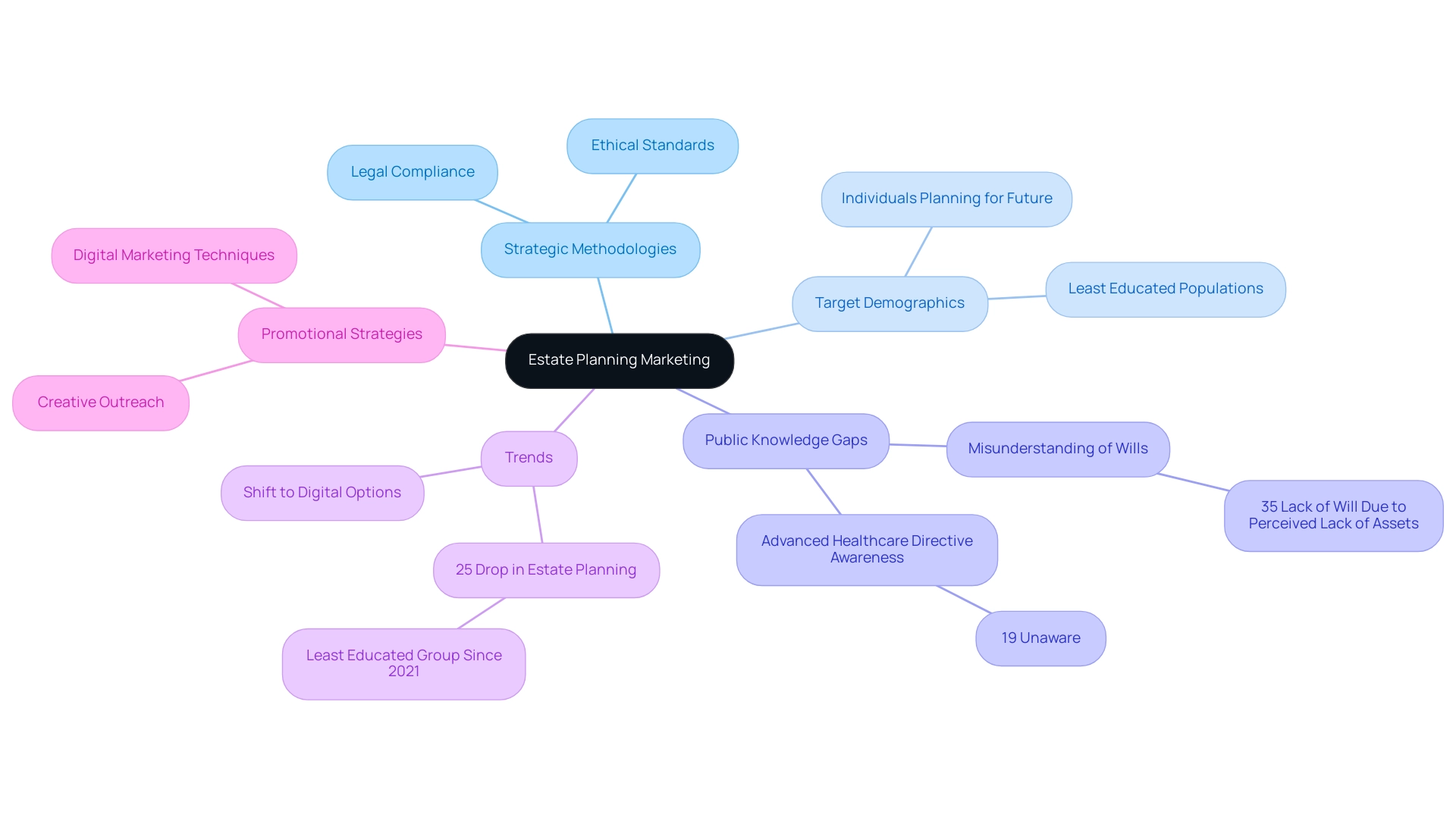
Effective Strategies for Attracting Clients in Estate Planning
Drawing in customers in the property management field requires a thorough marketing approach. Essential components of marketing for estate planning include:
- Developing insightful blog posts, eBooks, and videos that tackle prevalent estate planning queries, allowing attorneys to establish themselves as thought leaders.
Such educational content not only cultivates trust among potential clients but also enhances search engine visibility, which is crucial for effective marketing for estate planning and facilitating easier access to legal services. The content marketing process involves:
- Audience and topic research
- Content creation
- Distribution
- Performance evaluation
This ensures that efforts are targeted and effective.
- Search Engine Optimization (SEO): Implementing effective SEO practices is critical for ensuring that property management websites achieve high rankings in search results.
This encompasses optimizing for pertinent keywords, enhancing site speed, and ensuring mobile compatibility—key factors that influence client engagement and satisfaction. Notably, 50% of people who search locally for businesses like lawyers on their mobile visit an office within 24 hours, underscoring the importance of mobile optimization in attracting clients.
- Pay-Per-Click (PPC) Advertising: Strategically targeted PPC campaigns can significantly drive traffic to service offerings related to wills and trusts.
By deploying geo-targeting techniques and focusing on specific keywords, attorneys are able to engage in marketing for estate planning to connect with individuals actively seeking estate planning solutions in their vicinity.
Social Media Engagement: Utilizing platforms like Facebook and LinkedIn allows attorneys to build relationships with potential customers. By sharing informative content and engaging with followers, they can enhance visibility and cultivate relationships, which is essential in a competitive market.
According to recent statistics, 86% of attorneys utilize social media, with LinkedIn being the most popular platform, highlighting the effectiveness of social media engagement in legal marketing.
- Networking and Referrals: Cultivating relationships with financial advisors, accountants, and other professionals can yield valuable referrals. Involvement in networking events and interaction with local business organizations boosts community visibility and trust, further aiding in customer acquisition.
When implemented efficiently, these tactics can significantly enhance an attorney’s ability to draw in and keep customers within the property management sector.
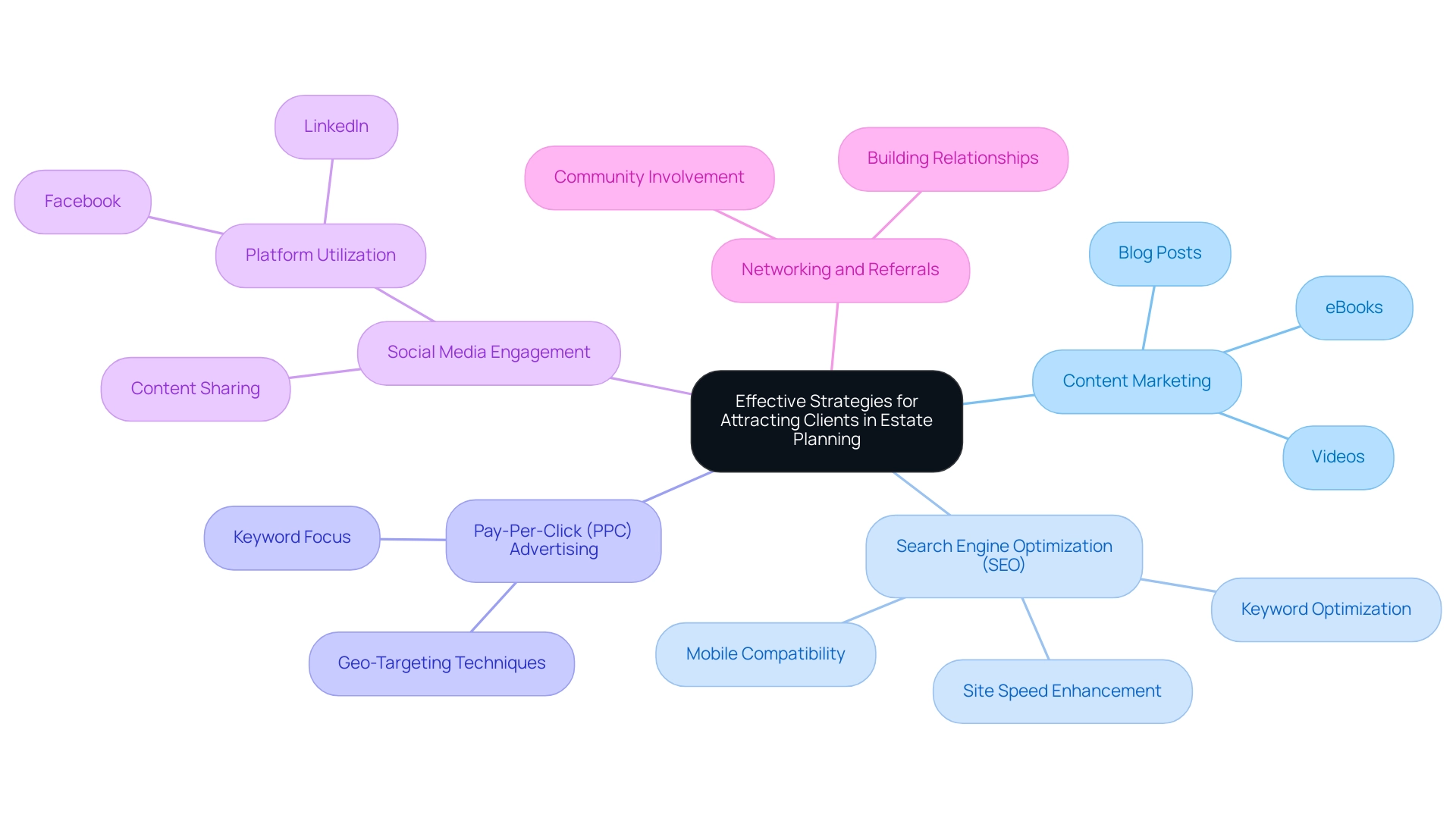
The Importance of Compliance in Estate Planning Marketing
Compliance in marketing for estate planning attorneys is crucial due to the sensitive and highly regulated nature of legal services. Attorneys must adhere to the advertising regulations established by state bar associations, which outline specific guidelines for promoting legal services. These regulations mandate that advertisements avoid misleading claims, refrain from overly aggressive tactics, and protect client confidentiality.
The ramifications of non-compliance can be severe, potentially resulting in disciplinary measures such as fines or even disbarment. In fact, businesses that implement a formal compliance charter can save, on average, $520,000, underscoring the financial benefits of adhering to these regulations.
Given that 50% of individuals who search for legal services locally on their mobile devices visit a law office within 24 hours, the urgency for accurate and compliant advertising is more pressing than ever. Legal professionals must ensure that their marketing for estate planning strategies are not only effective but also fully compliant with applicable regulations.
It is advisable to collaborate with legal promotion specialists or compliance officers to meticulously review all promotional materials related to marketing for estate planning before publication.
Furthermore, insights from the case study titled ‘SEO Strategies for Law Firms’ demonstrate that law firms can enhance their search engine rankings by focusing on high-quality content, keyword optimization, and building backlinks. Implementing these SEO strategies, while ensuring compliance, helps law firms attract more traffic and establish authority in their practice areas.
Recent findings also indicate that 52% of compliance experts claim insufficient data about partners exposes businesses to third-party risks, reinforcing the importance of thorough compliance checks in legal promotion.
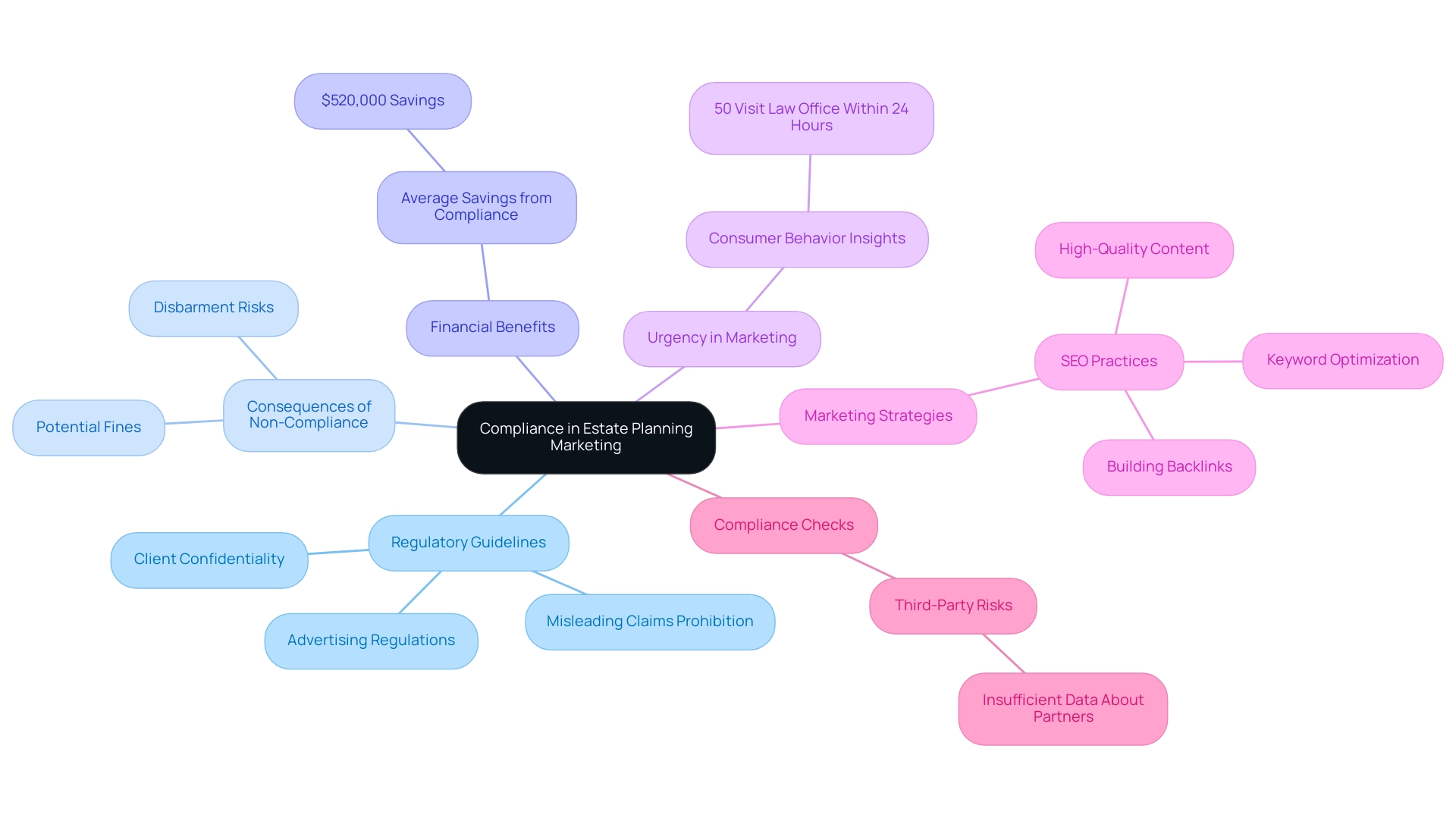
Leveraging Digital Tools for Estate Planning Marketing
Digital tools play a pivotal role in enhancing marketing for estate planning efforts by attorneys. Key technologies that can drive success include:
-
Customer Relationship Management (CRM) Systems: Implementing a CRM system is essential for attorneys to effectively manage interactions and streamline communication.
This technology ensures timely follow-ups and nurtures potential customers through the sales funnel, ultimately improving retention and satisfaction. -
Email Marketing Platforms: Email marketing remains one of the most effective methods for reaching customers and prospects.
By utilizing targeted email campaigns, attorneys can engage in marketing for estate planning by providing valuable information, announcing upcoming seminars, or notifying individuals about legislative changes that may impact them.
This direct line of communication fosters trust and keeps customers engaged. Indeed, recent statistics indicate that 46 contributions were made merely 3 minutes ago on keeping the audience engaged when presentation technology fails, emphasizing the significance of maintaining engagement in all promotional efforts. -
Webinars and Online Workshops: Conducting webinars allows attorneys to engage with prospective individuals while providing valuable insights into marketing for estate planning topics.
This method not only positions them as industry experts but also facilitates direct engagement, allowing for meaningful relationship building.
It is essential for attorneys to adapt their strategies, especially when technology fails, to keep their audience engaged. -
Analytics Tools: The use of analytics tools is crucial for attorneys to evaluate the effectiveness of their promotional initiatives.
By tracking metrics such as website traffic, conversion rates, and customer engagement levels, attorneys can analyze data that informs their strategies, enabling continuous improvement and optimization of promotional efforts.
Incorporating insights from industry experts, such as Joshua L. Raskin, can further enhance the discussion. Raskin emphasizes the necessity of leveraging these digital tools to not only enhance outreach but also improve service, ultimately driving business growth.
Incorporating these digital tools into their promotional strategies enables lawyers specializing in asset management to enhance outreach, improve client service, and ultimately drive business growth.
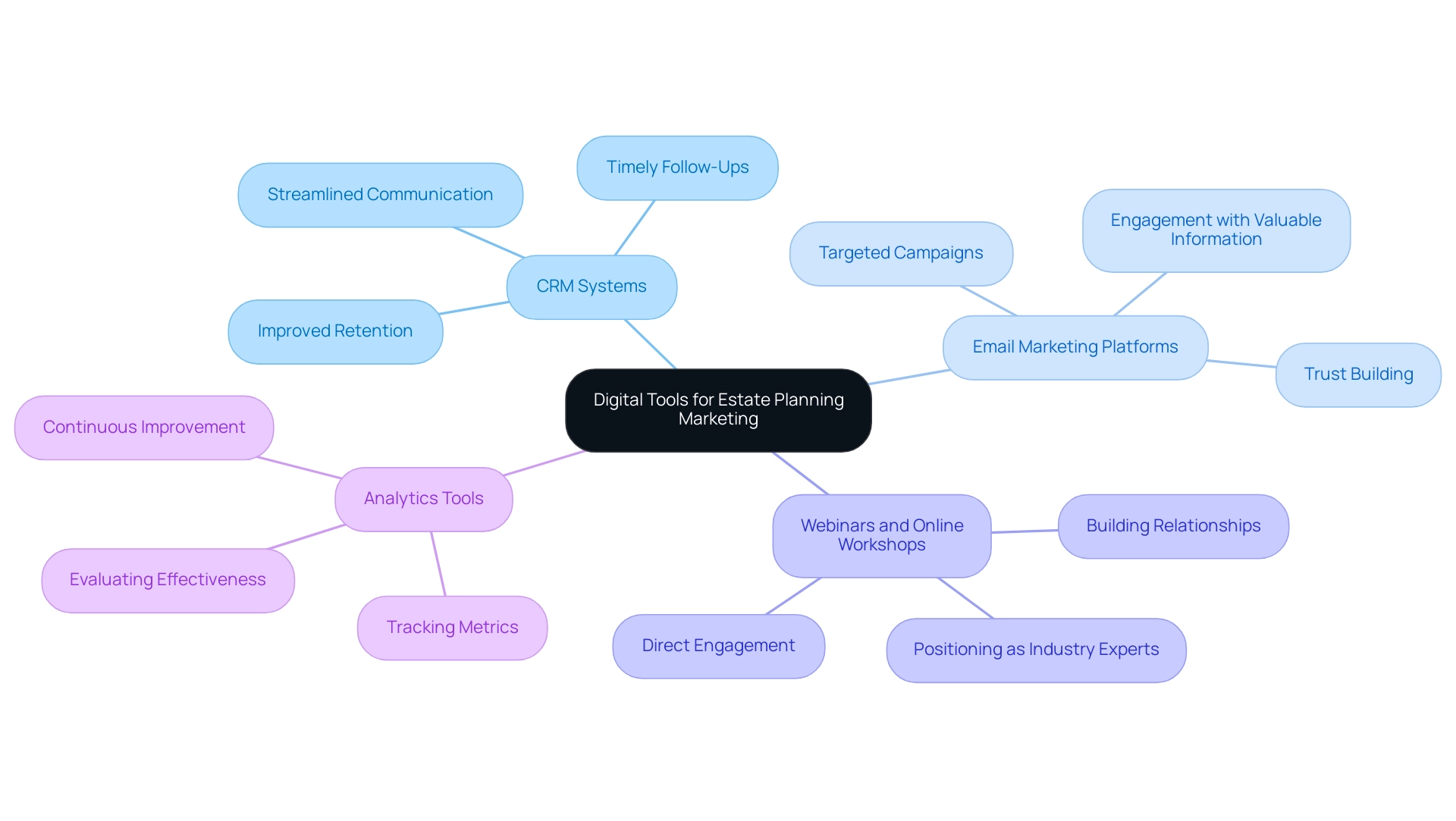
Measuring Success in Estate Planning Marketing
To effectively assess success in property management promotion, it is essential to monitor specific key performance indicators (KPIs) that accurately reflect the influence of promotional strategies. The following KPIs are essential for understanding and improving effectiveness in promotions:
-
Website Traffic: Tracking the number of visitors to an estate planning website offers valuable insights into the effectiveness of search engine optimization (SEO) and content promotion strategies. Increased traffic often correlates with heightened interest in services offered.
-
Lead Conversion Rates: Evaluating the percentage of website visitors who turn into leads—like those completing a contact form—provides essential information on the effectiveness of the website and related promotional campaigns. A higher conversion rate indicates successful engagement with potential clients.
-
Customer Acquisition Costs: Comprehending the financial expenditure necessary to obtain a new customer is crucial for assessing the return on investment (ROI) of promotional efforts. This metric helps attorneys allocate resources more effectively, ensuring sustainable business growth. Given that family law matters incurred the highest expenses at $312,550, effective marketing for estate planning strategies becomes even more vital in this competitive landscape.
-
Customer Retention Rates: Measuring the rate at which customers return for additional services serves as an indicator of service quality and overall satisfaction. High retention rates indicate effective relationship management and customer loyalty. As noted in a case study, establishing clear communication boundaries can significantly enhance relationships, which is crucial for retaining individuals in estate planning.
-
Engagement Metrics: Analyzing engagement levels on social media platforms and email campaigns enables attorneys to determine which types of content resonate most with their audience. This insight can guide future content strategies, enhancing overall promotional effectiveness. As a pertinent quote suggests, addressing micromanagement by establishing clear communication boundaries can aid in managing client relationships and expectations effectively.
Regularly reviewing these metrics allows attorneys to adjust their promotional strategies, ensuring they effectively reach and convert potential clients. By focusing on these KPIs, legal professionals can navigate the complexities of marketing for estate planning with greater precision and success.
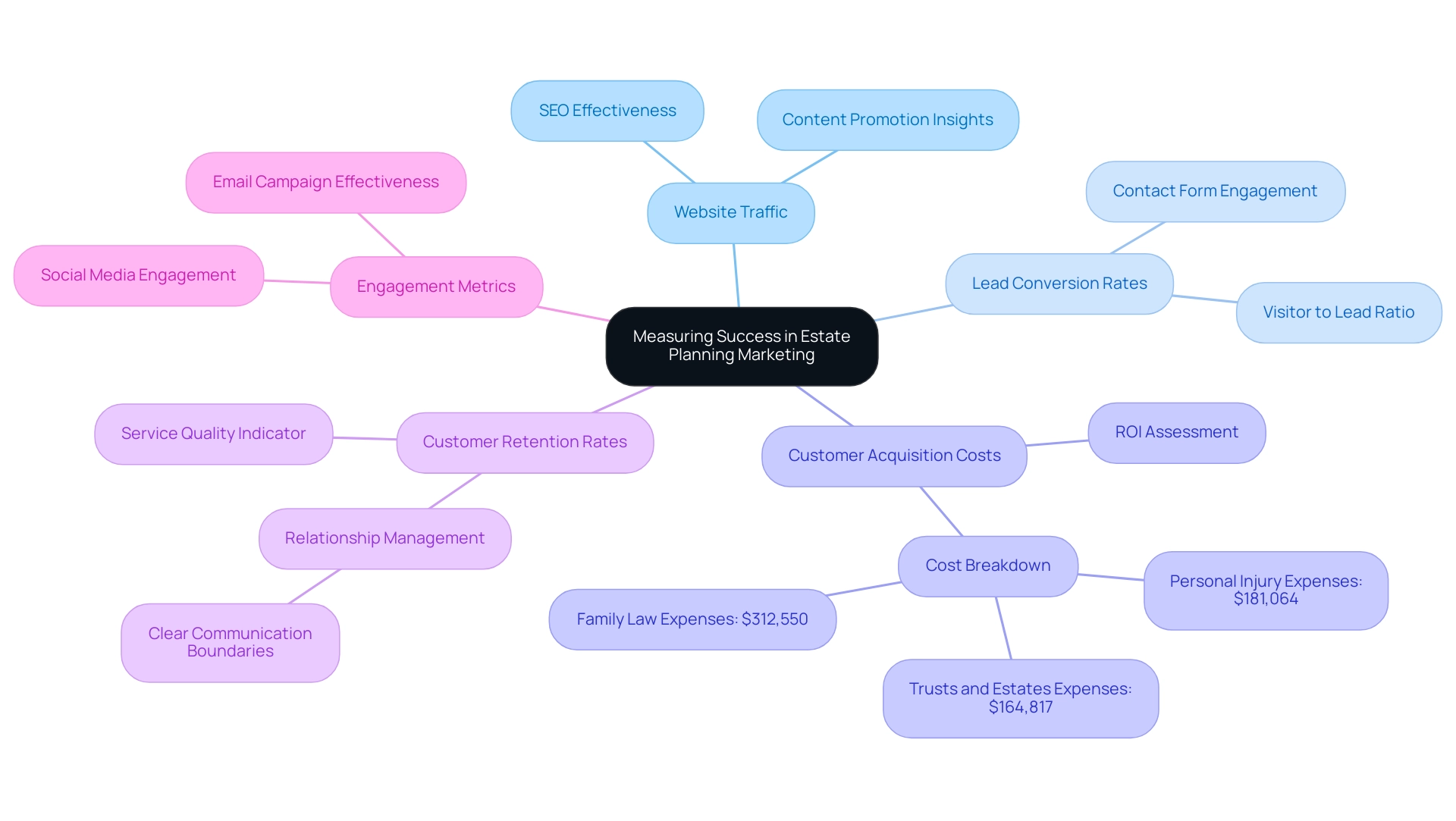
Conclusion
Effective marketing strategies are indispensable for legal professionals in the estate planning sector, where competition is fierce, and public understanding of services is often lacking. By employing a multifaceted approach that includes:
- Content marketing
- SEO
- Social media engagement
Attorneys can enhance their visibility and establish themselves as trusted authorities. Educational content not only addresses the knowledge gaps highlighted in the article but also builds credibility, fostering stronger relationships with potential clients.
Compliance with legal advertising regulations is paramount, ensuring that marketing efforts are ethical and effective. By collaborating with compliance experts and utilizing digital tools like:
- CRM systems
- Analytics platforms
Attorneys can streamline their processes, enhance client engagement, and measure the success of their marketing initiatives. The integration of these strategies not only drives business growth but also empowers clients to make informed decisions about their estate planning needs.
In summary, the landscape of estate planning marketing is evolving, necessitating innovative, compliant, and client-focused strategies. Legal professionals who adapt to these changes will not only attract more clients but also contribute to a better-informed public, ultimately elevating the standards of the profession. The time for action is now; embracing these marketing techniques will pave the way for sustained success in the estate planning field.

